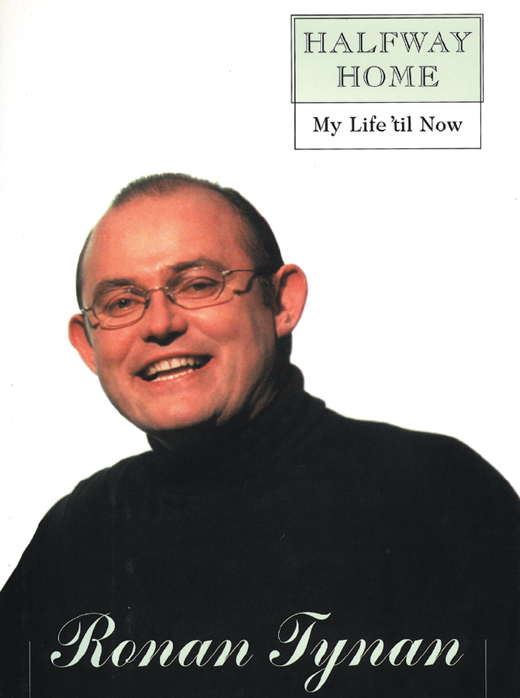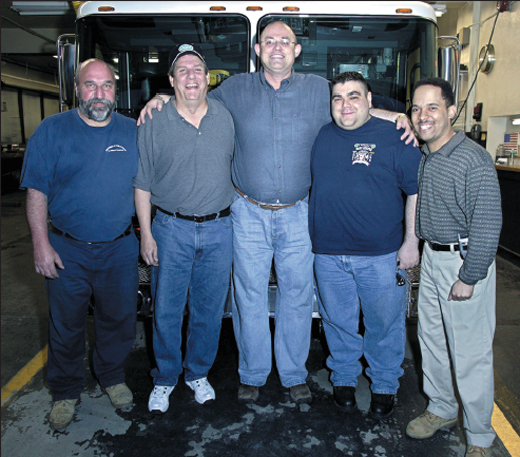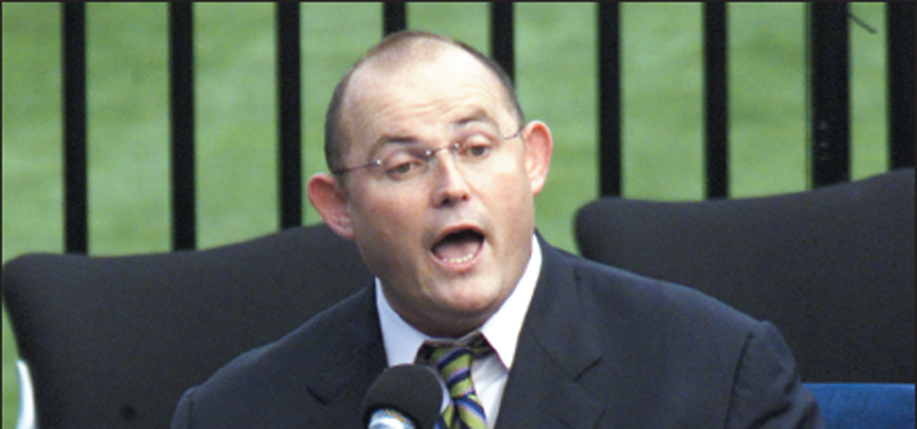Following on the coattails of the great John McCormack, Ronan Tynan seems destined to be the most popular Irish tenor ever.
℘℘℘
“Let’s listen to Ronan Tynan.” The CNN commentators on President Ronald Reagan’s funeral broadcast are silent as the Irish tenor’s voice rises effortlessly in Schubert’s “Ave Maria” filling the National Cathedral in Washington D.C. Tynan’s face is the picture of composure as he sings the first of two pieces with the U.S. Marine Chamber Orchestra — later in the service he would sing “Amazing Grace.”
It was a fitting tribute to a popular U.S. President, and another huge stepping stone in a career that has been on the verge of super-stardom since Tynan began his musical journey just a few years ago. Along the way he has been embraced by all manner of people — from Nancy Reagan (he sang at her birthday party three years ago and she personally requested that he perform at her hushand’s funeral) — to the widows or New York firefighters (he sang at many of their husbands’ memorials). He also sang at Mayor Rudolph Giuliani’s wedding to Judith Nathan in May 2003.
Tynan, who made New York City his home in 2000, has become a Yankees favorite, singing his rousing version of “God Bless America” at all their home games. In June 2004, he sang the song that sets the tone of one of the foremost horse races or the year, “New York, New York,” at the Belmont Classic. Equally popular in his native Ireland, Tynan sang the athletes’ song “May We Never Have to Say Goodbye” at the Special Olympics World Summer Games in Ireland in June 2003. But his performance at President Reagan’s funeral, watched by an estimated 35 million people, was his biggest audience to date.
It is always amazing to realize that Tynan is a double amputee. A towering 6′ 5″, he dashes around New York City with such agility that you would never know he is supported by prostheses. He also keeps a horse farm in Ireland and is a skilled rider. In fact, his disability is not worth mentioning unless there’s some correlation between his life’s story — eloquently told in his best-selling biography Halfway Home — and his ability to connect to people who have suffered tragedy.

Anne Downing is a case in point. Tynan sang at her firefighter husband’s funeral, and again at the funeral of her young son, Michael, whom she lost to cancer. Hearing Tynan sing “In the Arms of an Angel,” at Michael’s mass, “was the first time I felt hope,” Anne told Irish America.
Recently featured in a Showtime presentation on Northern Ireland teenagers who lost parents to the “troubles,” his obvious camaraderie with the group comes through on the screen. Tynan’s own ability to “keep on keeping on” comes from the loving environment in which he was raised.
His parents supported him with love and never allowed him to let his disability stand in his way. He went to an all-boys boarding school where his tenacity won him respect. One of the more poignant scenes in his biography relates how he was picked to play in a game of hurling by a lad who knew Tynan might not be the best player but that “he’d play his heart out.”
By playing his heart out Tynan won several gold medals in the Paralympic Games, went to medical school and became a doctor specializing in disabilities. It wasn’t until he was 30 that, encouraged by his father, he began to study voice. He won the John McCormack Cup for Tenor Voice less than one year after beginning classes. The following year he was awarded the prestigious International Operatic Singing competition in Maumarde, France. His debut album My Life Belongs to You turned platinum just a couple of weeks after its release. In 1998, Tynan joined the Irish Tenors, Anthony Kearns and Finbar Wright, and the trio soon became legendary. They played to soldout audiences around the world, especially in America, where they were greeted enthusiastically at every turn. Tynan, in particular, became a favorite on PBS specials, his relaxed and affable manner making him a huge hit with the fans.
The six albums he did with the Irish Tenors, including Heritage, Ellis Island, Christmas and Live from Belfast, sold millions, but Tynan, already carving a path for himself, decided to go it alone this year. His last concert with the Tenors will be on July 17.
I talk to Tynan on Monday, June 14th and find him in the middle of preparations for President Reagan’s funeral.
“I’m getting sorted out here. Going through orchestral pieces to get it all arranged,” he explains, but he makes time to talk. And so with interruptions from various people, including Major Rogers of the Marine Chamber Orchestra, we finally have our chat.
Patricia Harty: What a huge honor, Ronan.
Ronan Tynan: It’s an amazing honor. My heart goes out to the Reagan family and to Mrs. Reagan, because I really do understand the hardship and the sadness that she has gone through with that ravaging disease Alzheimer’s. I feel personally that now President Reagan has gone on to a better place.
PH: How did this performance come about?
RT: Jerry Perrenchio of Univision was putting together a surprise birthday party for Nancy Reagan three years ago and he thought I would do a great job.
So I said fine and when I met her [Nancy Reagan] she was absolutely adorable to me. We got on very well. I told her that my own mom has Alzheimer’s and she said, “so you understand,” and I said, “I do indeed.” And the next I hear from her is that she wanted me to sing at the funeral.
PH: It seems that is the way your life is going — from one success to another. Do you get scared?
RT: Oh God. I get scared, I really get scared. This country and people have been so great to me. My biggest philosophy in life is to give generously and to always be willing to give back, and, you know, it has always worked for me.
PH: Would you say that some of the giving you did after September 11th is coming back to you?
RT: That was a very tragic time. It was very difficult, and everybody wanted to try and take the burden of pain away from people.

PH: Why do you think people relate to you?
RT: Honest to God, I have no idea.
PH: Maybe it’s because if they know a little bit about your life story, then they can relate.
RT: Maybe they’ve seen a little bit of my life story and I’m approachable. I suppose I’m somewhat relatively normal. Jeez, I don’t want people to believe that [laughs].
PH: What gave you the confidence to overcome your disability?
RT: There is no doubt in my mind that my parents made the most amazing contribution to me. You have to credit them for everything. My parents gave me everything.
PH: Tell me about leaving the Tenors.
RT: I’d been enjoying it [being with the Tenors] tremendously. I just thought that I would like to take a break and do different things. And also I felt that with so many other things going on in my life, I didn’t want to hold up the lads.
PH: Do you think that the fact that you live in America and they live in Ireland is a factor?
RT: There’s no question but it’s a factor. I’ll tell you one thing, there is nothing like this country. There’s nothing like the people. They rejoice in people’s achievements. They encourage people to go way beyond what they could ever dream of doing. And they are fantastically appreciative of anything you do for them. The country is a gift. This is the United States, and it’s united because of its people.
PH: From the way you sing “New York, New York,” it’s obvious that the City has a special spot in your heart.
RT: There’s no place like it. I love it. If there’s a place you want to live in the States just to get a real sample of eclectic tastes, you have it all at your doorstep in New York.
PH: Do you have some of that Irish fear of success?
RT: You have to be aware that by taking on big things, you’re leaving yourself wide open for the whole world to see. Not just that you’re willing to put your whole heart and soul right into it but that you’re showing them that you’re capable of doing it, and you’re going to do it. But the fear you have inside is that when you put yourself up for it, you know yourself you have to deliver it. That gets the adrenaline running as well as the excitement of performance; it also gives you that little bit of fear.
PH: What’s your way to relax before a performance?
RT: I pray. Because at the end of the day I think that’s the only thing that will get me through it. I’ve always said that when push comes to shove, I’m not too shy about asking God for help.
PH: You were recently featured in a TV documentary on Northern Ireland. Can you talk a little bit about the kids you met them?
RT: Every so often there are parts of your life when you realize that you are so lucky. That you think you’ve had a little bit of trial and challenge, but when you meet kids who have lost their parents — some of whom have been killed in front of them — you realize how much more devastating it is. And how much of an effect it has on a young impressionable little girl or boy. And you think, my God, the senseless action of killing people. I walked Belfast and walked into the Shankill and the mile as they call it. And looked at all the memorials. And these kids have come up with their own way of expressing themselves [through art]. It was amazing the way they articulated their feelings. It would absolutely stun you into silence. It really opened my eyes, and showed me how much you can learn from children.
They are fantastic and, of course, unbelievably mature, but they still have a wonderful sense of humor and amazing camaraderie. And you know, it was the simplest things they were looking for, like a signed poster of Westlife or an autograph of Bono.
PH: When did you first start singing professionally?
RT: It was in 1993 and that was in my fifth year of medical school. My father and myself kind of planned my singing career — we did a launch [laughs]. We said, “The world needs to hear this.” I wish they could have heard both of us. My dad died in 1998. He missed all of it, but he didn’t really because I know well that he’s tuned in.
PH: Do you miss being a doctor?
RT: Good question. I was out with my friend Keith Synott, last night. Keith is an orthopedic [surgeon]. He’s doing a fellowship at the Hospital of Special Surgery and he’s got a consultancy post in the Mather hospital in Dublin. Keith and I were best friends through college. But, do I miss it? I would lie if I said I didn’t. I do. I think the daft thing is I more than likely would have had a consultancy in rehabilitation myself at this stage but, you know, that wasn’t meant to be my life.
PH: Are you working on an album?
RT: I’m working on two new albums actually. Hopefully they’ll come out next year.
PH: Will they be different from before?
RT: Oh definitely. I’ll never go away from my Irish roots. I’m always very proud to be Irish. But I’ll tell you one thing, I would be equally as proud to be an American. It’s a great country; I love it. It’s been a country that has given me everything. ♦


Leave a Reply